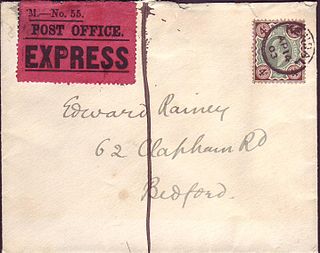An international reply coupon (IRC) is a coupon that can be exchanged for one or more postage stamps representing the minimum postage for an unregistered priority airmail letter of up to twenty grams sent to another Universal Postal Union (UPU) member country. IRCs are accepted by all UPU member countries.
The Universal Postal Union is a specialized agency of the United Nations (UN) that coordinates postal policies among member nations and facilitates a uniform worldwide postal system. It comprises 192 member states and is headquartered in Bern, Switzerland.

An aerogram, aerogramme, aérogramme, air letter or airletter is a thin lightweight piece of foldable and gummed paper for writing a letter for transit via airmail, in which the letter and envelope are one and the same. Most postal administrations forbid enclosures in these light letters, which are usually sent abroad at a preferential rate. Printed warnings existed to say that an enclosure would cause the mail to go at the higher letter rate.
Franking comprises all devices, markings, or combinations thereof ("franks") applied to mails of any class which qualifies them to be postally serviced. Types of franks include uncanceled and precanceled postage stamps, impressions applied via postage meter, official use "Penalty" franks, Business Reply Mail (BRM), and other permit Imprints (Indicia), manuscript and facsimile "franking privilege" signatures, "soldier's mail" markings, and any other forms authorized by the 192 postal administrations that are members of the Universal Postal Union.

.post is a sponsored top-level domain (STLD) available exclusively for the postal sector. It is secured by DNSSEC. The domain aims to integrate the physical, financial and electronic dimensions of postal services to enable and facilitate e-post, e-finance, e-commerce and e-government services. The domain was approved by ICANN on April 8, 2005 as a sponsored TLD in the second group of new TLD applications evaluated in 2004.

Express mail is an expedited mail delivery service for which the customer pays a premium for faster delivery. Express mail is a service for domestic and international mail, and is in most nations governed by the country's own postal administration. Since 1999, the international express delivery services are governed by the EMS Cooperative.

Parcel post is a postal service for mail that is too heavy for normal letter post. It is usually slower than letter post. The development of the parcel post is closely connected with the development of the railway network which enabled parcels to be carried in bulk, to a regular schedule and at economic prices. Today, many parcels also travel by road and international shipments may travel by sea or airmail.

Illegal stamps are postage stamp–like labels issued in the names of existing independent countries or territories used to defraud postal administrations, stamp collectors, and the general public. Often, but not always, a member nation of the Universal Postal Union (UPU) will have asked the UPU to issue an "International Bureau Circular" advising others of the illegal stamps. According to the UPU, the market is estimated to be at least $500 million per year.
The Treaty of Bern, signed on 9 October 1874, established the General Postal Union, which is today known as the Universal Postal Union. Named for the Swiss city of Bern, where it was signed, the treaty was the result of an international conference convened by the Swiss Government on 15 September 1874. It was attended by representatives of 22 nations. Plans for the conference had been drawn up by Heinrich von Stephan, Postmaster-General of the German Reichspost who demanded from the neutral Switzerland the organization of an International Postal Congress following the end of the French-German war of 1870–1871.

The Palestinian National Authority began in 1994 to issue stamps and operate postal services as authorized by the Oslo Accords.

The postal history of Turkey and its predecessor state, the Ottoman Empire, dates to the 18th century when foreign countries maintained courier services through their consular offices in the Empire. Although delayed in the development of its own postal service, in 1863 the Ottoman Empire became the second independent country in Asia to issue adhesive postage stamps, and in 1875, it became a founding member of the General Postal Union, soon to become the Universal Postal Union. The Ottoman Empire became the Republic of Turkey in 1923, and in the following years, its postal service became more modernized and efficient and its postage stamps expertly designed and manufactured.

Fonopost, or Phonopost, was an experimental postal service in Argentina to record a person's voice and deliver the resulting recording by mail.

In philately a parcel stamp is a stamp specifically issued to pay the fee for the transport of a parcel through the postal system and usually marked as such. It is to be distinguished from a postage stamp used to pay the cost of posting a parcel, although there may no practical distinction as far as the sender is concerned. Parcel stamps issued by governments have the same status in philately as postage stamps, but parcel stamps issued by private railway companies or road carriers are regarded as cinderella stamps and many parcel stamps are also railway stamps.
The Barbados Postal Service (B.P.S.) is the national postal operator of Barbados and operates as a department within the Government of Barbados where it reports to the Ministry of Home Affairs. The Barbados Postal Service (B.P.S.) is headed by the acting Postmaster General, Sheila Greaves, who is responsible for maintaining the island’s postal services, subject to the laws of the island. In 1852, the Postal services for Barbados were reconstituted following the passage of local legislation enabling the delivery of inland postage.

A bulletin d'expédition, sometimes known as a parcel card, is a parcel despatch note. Bulletin d'expédition have been widely used across the world. They may travel with the parcel and be delivered at the same time, or they may indicate to the recipient that a parcel is ready to be collected from their local post office. The cards were introduced after the establishment of the international parcel service by the Universal Postal Union on 1 October 1881, following the Paris agreement of 1880.

Kyrgyz Express Post is the postal operator of Kyrgyzstan that was granted the status of the second designated postal operator of Kyrgyzstan. The company was founded on March 16, 2012.
The following lists events that happened with or in collaboration with the United Nations and its agencies in the year 2019.












